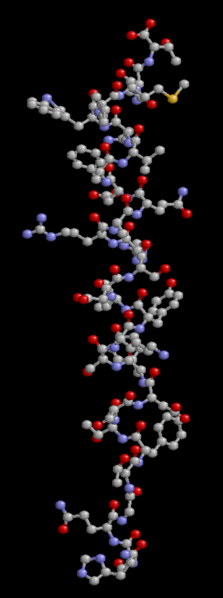-
 Cytoplasm
Cytoplasm
-
 Internal combustion hydrogen engine
Internal combustion hydrogen engine
-
 Cross linking
Cross linking
-
 Arthropyosis
Arthropyosis
-
 Venus Express
Venus Express
-
 Alanine
Alanine
-
 Frame
Frame
-
 Helicase
Helicase
-
 Packet switching
Packet switching
-
 Amalgam
Amalgam
-
 Mumps virus
Mumps virus
-
 Lithosphere
Lithosphere
-
 Aneuploidy
Aneuploidy
-
 Tabular facies
Tabular facies
-
 Toluene
Toluene
-
 Paramagnetic
Paramagnetic
-
 Homo ergaster
Homo ergaster
-
 OCD
OCD
-
 SIM microscopy
SIM microscopy
-
 Wader
Wader
-
 Borborygmus
Borborygmus
-
 DES
DES
-
 Dermis
Dermis
-
 CHAP
CHAP
-
 Cnidaria
Cnidaria
-
 Asymptotic giant branch
Asymptotic giant branch
-
 Galactocentric coordinate
Galactocentric coordinate
-
 Stylolites
Stylolites
-
 Neoteny
Neoteny
-
 Euhaline water
Euhaline water
Glucagon
Glucagon is a hormone secreted by the pancreas, the role of which is to stimulate the breakdown of glycogen into glucose.
Structure of glucagon
Glucagon has a relatively simple structure as it is a relatively small peptide containing only 29 amino acids. It is produced in the pancreas by the alpha cells of the islets of Langerhans.
Function of glucagon
Glucagon has a hormonal function that counters insulin, causing an increase in blood glucose (hyperglycaemic function). It hydrolyses glycogen in the liver to do this causing release of glucose molecules into the blood. This effect is called glycogenolysis.
Regulation of the action of insulin and glucagon maintains a correct blood glucose concentration appropriate for the body's efforts.

Glucagon is a relatively short peptide hormone. © brian0918, Wikimedia, public domain
Latest
Fill out my online form.



